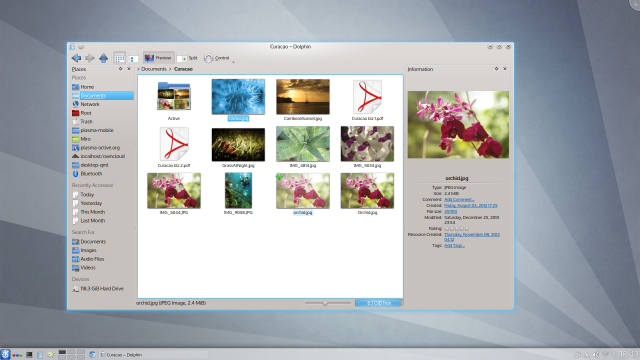KDE Ships First Beta of Plasma Workspaces, Applications and Platform 4.10
Wednesday, 21 November 2012
Today KDE released the first beta for its renewed Workspaces, Applications, and Development Platform. With API, dependency and feature freezes in place, the KDE team's focus is now on fixing bugs and further polishing new and old functionality.
Highlights of 4.10 include, but are not limited to:
- Qt Quick in Plasma Workspaces -- Qt Quick is continuing to make its way into the Plasma Workspaces. Plasma Quick, KDE's extensions on top of QtQuick allow deeper integration with the system and more powerful apps and Plasma components. Plasma Containments can now be written in QtQuick. Various Plasma widgets have been rewritten in QtQuick, notably the system tray, pager, notifications, lock & logout, weather and weather station, comic strip and calculator plasmoids. Many performance, quality and usability improvements make Plasma Desktop and Netbook workspaces easier to use.
- New Screen Locker -- A new screen locking mechanism based on QtQuick brings more flexibility and security to Plasma Desktop.
- Animated Wallpapers -- Thanks to a new QtQuick-based wallpaper engine, animated wallpapers are now much easier to create.
- Improved Zooming in Okular -- A technique called tiled rendering allows Okular to zoom in much further while reducing memory consumption. Okular Active, the touch-friendly version of the powerful document reader is now part of KDE SC.
- Faster indexing -- Improvements in the Nepomuk semantic engine allow faster indexing of files. The new Tags kioslave allows users to browse their files by tags in any KDE-powered application.
- Color Correction -- Gwenview, KDE's smart image viewer and Plasma's window manager now support color correction and can be adjusted to the color profile of different monitors, allowing for more natural representation of photos and graphics.
- Notifications -- Plasma's notifications are now rendered using QtQuick, notifications themselves, especially concerning power management have been cleaned up.
- New Print Manager -- Setup of printers and monitoring jobs was improved thanks to a new implementation of the Print Manager.
- Kate, KDE's Advanced Text Editor received multiple improvements regarding user feedback. It is now extensible using Python plugins.
- KTouch -- KDE's touch-typing learning utility has been rewritten and features a cleaner, more elegant user interface.
- libkdegames improvements -- Many parts of libkdegames have been rewritten, porting instructions for 3rd party developers are available.
- KSudoku now allows printing puzzles.
- KJumpingCube has seen a large number of improvements making the game more enjoyable.
Actual users are critical to maintaining high KDE quality, because developers simply cannot test every possible configuration. We're counting on you to help find bugs early so they can be squashed before the final release. Please consider joining 4.10 thoroughly and report any bugs you find to bugs.kde.org.
KDE Software Compilation 4.10 Beta1
The KDE Software Compilation, including all its libraries and its applications, is available for free under Open Source licenses. KDE's software can be obtained in source and various binary formats from download.kde.org or with any of the major GNU/Linux and UNIX systems shipping today.
Installing 4.10 Beta1 Binary Packages
Packages. Some Linux/UNIX OS vendors have kindly provided binary packages of 4.10 Beta1 (internally 4.9.80) for some versions of their distribution, and in other cases community volunteers have done so. Additional binary packages, as well as updates to the packages now available, may become available over the coming weeks.
Package Locations. For a current list of available binary packages of which the KDE Project has been informed, please visit the Community Wiki.
Compiling 4.10 Beta1
The complete source code for 4.10 Beta1 may be freely downloaded. Instructions on compiling and installing 4.9.80 are available from the 4.9.80 Info Page.
Supporting KDE
KDE is a Free Software community that exists and grows only because of the help of many volunteers that donate their time and effort. KDE is always looking for new volunteers and contributions, whether it is help with coding, bug fixing or reporting, writing documentation, translations, promotion, money, etc. All contributions are gratefully appreciated and eagerly accepted. Please read through the Supporting KDE page for further information or become a KDE e.V. supporting member through our new Join the Game initiative.
About KDE
KDE is an international technology team that creates free and open source software for desktop and portable computing. Among KDE’s products are a modern desktop system for Linux and UNIX platforms, comprehensive office productivity and groupware suites and hundreds of software titles in many categories including Internet and web applications, multimedia, entertainment, educational, graphics and software development. KDE software is translated into more than 60 languages and is built with ease of use and modern accessibility principles in mind. KDE’s full-featured applications run natively on Linux, BSD, Windows, Haiku, and macOS.
Trademark Notices.
KDE® and the K Desktop Environment® logo are registered trademarks of KDE e.V..
Linux is a registered trademark of Linus Torvalds. UNIX is a registered trademark of The Open Group in the United States and other countries.
All other trademarks and copyrights referred to in this announcement are the property of their respective owners.
Press Contacts
For more information send us an email: press@kde.org
